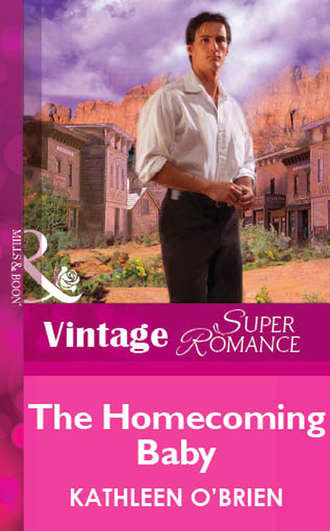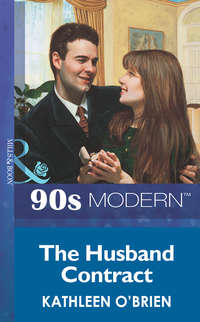
Полная версия
The Homecoming Baby
CHAPTER TWO
“OKAY,” CELIA BRICE SAID to her weeping patient. “I’ve got an idea. Let’s just lay the whole sad story out on the table and see how it looks.”
Celia smiled over at Rose Gallen, who had run through an entire box of Kleenex in the first thirty minutes of their session. Actually, Rose had used up four boxes in four sessions so far, and Celia had decided it was time to try a different approach.
“All right,” Rose said. She pulled out another Kleenex just in case, and stared at Celia with damp eyes. “What do you mean?”
“I mean let’s analyze the situation objectively. Let’s be sure I have the basic details right. Your thirty-two-year-old husband, who you said has a mean temper, iffy personal hygiene and a bad snoring problem, who got laid off nearly a year ago but still spends fifty-five dollars a week on liquor and cigarettes, ran off last month with a nineteen-year-old bimbo.”
Rose blinked. “Yes,” she said uncertainly. “But that’s just the bad stuff. He’s not always—”
Celia kept going. Usually psychologists just listened, but sometimes they had to redirect the flow.
“He did this, in fact, the day after you told him you were pregnant. You don’t hear a word for a full month. But now he calls. Collect from Phoenix. And what does he want? He wants you to wire him five hundred dollars to have the transmission in his girlfriend’s car repaired.”
Rose frowned.
“Yes,” she said again. She touched the Kleenex to her eye and wiped away a tear. “You make it sound pretty bad.”
“Just laying out the details you gave me, Rose.” Celia took a deep breath. “So my question is…are you sure that what you really, truly want to do right now is cry?”
Rose stared at Celia, as if the question mystified her. “I’m all alone. I’m pregnant.”
Celia didn’t blink. She didn’t say a word. It was up to Rose to consider the possibility that there might conceivably be another reaction. Celia’s instincts told her that the young woman was ready.
Rose seemed to be thinking hard. She sniffed once, then again, louder. She transferred the stare to the tissue in her hand, and then she slowly, deliberately crumpled it into her fist.
“You know,” she said finally, “you’re right.” Her voice was amazingly firm. “I don’t want to cry. I want to tell the son of a bitch to go straight to hell.”
Celia leaned back with a sigh. This was just momentary bravado, of course, but it was good. Very good.
She didn’t underestimate the difficulties ahead for Rose; the journey to true self-sufficiency was always long. And Celia should know. She was still traveling it herself, having decided just last month, after yet another particularly disappointing relationship, to take a complete vacation from men.
Frankly, the decision had been a relief. She spent all day solving the problems these women had with their husbands, boyfriends, lovers or sons. She didn’t have time for any man problems of her own.
Besides, who needed a man when you had work as gratifying as this? It was exciting to watch people take the first, most difficult step on that journey, as Rose had just done. She had admitted that she was angry, and that she didn’t deserve to be treated like dirt under Tad Gallen’s shoes.
“Okay. You’d like to tell him to go to hell. Let’s talk about that.” Under the table, Celia kicked off her shoes. This session was going to run late. But it was going to be worth it.
An hour later, when she said goodbye to a much happier Rose, it was almost dark and The Birth Place, the best birthing center within five hundred miles of Enchantment, New Mexico, was almost empty.
Though Celia wasn’t officially a clinic employee, she counseled many of the pregnant women who came here, helping them deal with the varied emotional complications that could accompany pregnancy, both pre-and postpartum.
One of the upstairs offices was set aside for Celia two afternoons a week. Often it was easier for the women to combine their medical checkup with their counseling session. So though Celia might not be on the payroll, she definitely felt like a member of the team.
Dangling her shoes from two fingers, she wandered through the quiet hallway now, stretching her back and neck, which were cramped from sitting so long in one place. As she passed the accountant’s office, she noticed that Kim Sherman’s light was off—a sign of the new, happier Kim, the one who finally had a life outside this clinic.
Lydia Kane, the director, was still here, of course. Her light rarely went off, no matter how late it got. In fact, sometimes Celia fancied that Lydia’s office was the beating, breathing heart of the clinic. Good for the clinic…but an enormous burden for Lydia, who, Celia thought, had been looking tired lately.
But telling Lydia to take it easy was like telling Niagara Falls to slow down. Though she was in her seventies, the amazing woman had the strength and determination of a mountain lion. Every pregnant woman in this clinic—and every staff member, too—relied on that strength.
Celia moved into the main reception area, looking for Trish Linden, the clinic receptionist. Trish and Celia lived in the same apartment complex and frequently rode home together. Over the past few years, they’d become close friends.
Trish must be running late, too. Celia could smell the sweet scent of peach tea around the reception counter, a sure sign that Trish had been there just moments ago. But she hadn’t cleaned up yet. Toys were still upended around the children’s play area. Magazines and cushions were haphazardly scattered over the comfortable sofas.
Celia loved the clinic at night. When the lights were low, shining on the Mexican tile floors, and things were quiet, you might mistake this reception area for the living room of a very happy home. Which, in a way, it was.
Celia neatened up a bit, and then she plopped onto one of the armchairs to wait for Trish. She curled her feet under her and pulled the big clip out of her hair, letting it tumble over her shoulders. She sighed as her tired body relaxed.
She hoped Trish would come back soon. She could use a cup of soup, a bath and about ten hours sleep. Good thing she’d given up men. If she had one at home right now waiting for a back rub or a gourmet dinner, she’d probably hide out here all night.
She almost did anyway. The classical music coming through the sound system was low and soothing, and she must have dozed off. She woke with a start, aware that someone nearby was quietly crying.
For a moment she imagined she was back with Rose Gallen, watching the Kleenex pile up. But, as the sleepy fog lifted, she realized she was in the reception area…and the crying was coming from behind the high reception counter.
She struggled to her feet. “Trish?”
The crying stopped. By the time Celia made her way to the edge of the counter, Trish had stood up and was smiling as she subtly dashed away wetness from beneath her eyes.
“Oh, hi! I’m sorry. I thought you were still back with Rose.”
Wasn’t that like Trish, apologizing for crying, as if she had no right to be unhappy, no right to inconvenience anyone else with her problems? Celia took her hand, which was still damp from wiping away tears.
“Hey. Tell me what’s wrong.”
“It’s nothing, really.” But Trish couldn’t quite pronounce her N. She’d been crying long and hard enough to completely stop up her nose.
“Trish.” Celia was worried. Trish wasn’t a big weeper. In fact, she was one of the least self-indulgent people Celia knew.
At forty-five, Trish’s life seemed to consist entirely of work. Long hours at the clinic, then more hours volunteering in the community. Up early to tend her beloved garden at home, up late to keep her little apartment spotless. It was as if she had assigned herself a perpetual penance.
“Trish, it’s not good to hold things in. Please, tell me what’s going on.”
“Honestly, it’s nothing.” But she must have seen Celia’s stubborn skepticism, because she smiled. “Well, it’s such a little thing. It’s almost nothing.”
She waved her hand toward a large box on the floor behind her desk. “You know how they were collecting old dresses for the vintage clothing auction?”
Celia nodded. The local Women’s Club was auctioning off vintage dresses to raise money for the Teen Center. She had donated a couple herself. One from her senior prom ten years ago, and a couple of bridesmaid’s dresses, which weren’t quite vintage, technically…but close enough.
She knew she’d never wear those stiff, uncomfortable gowns again. She hated dressing up—her daily wardrobe was all long, full skirts, gypsy tops and khaki slacks and blue jeans.
“Well,” Trish went on, her voice still thick and husky, “I gathered together a lot of Angelina’s old clothes and donated them. They were so beautiful, you know. I’d kept them all these years because…”
Her voice trailed off. But she didn’t need to finish. Celia knew why Trish had kept them. She’d kept them because they were all she had left of her glamorous older sister, a sister who had disappeared thirty years ago.
“Oh, Trish,” Celia breathed. “That was unbelievably generous.” She knew how hard it must have been to let them go. Only Trish, so schooled in self-denial, would have been able to do it.
“I thought they might bring in quite a bit of money. And you know the Teen Center needs all the help it can get.”
“They must have been absolutely thrilled.” That was an understatement. Heaven only knew what Angelina’s wardrobe must have been worth.
The Lindens had once been the premiere family of Enchantment. Angelina had disappeared before Celia was even born, but everyone knew the story of the rebellious princess who roared through the night on the back of the town bad boy’s motorcycle, silky black hair flying in the wind, red sequins flashing in the moonlight.
“No,” Trish said. “They definitely weren’t thrilled. This box was delivered to me an hour ago. The Women’s Club thanks me for the offer, but they’re afraid they won’t be able to use the dresses after all.”
“What?”
Trish pointed to the box again. “They returned every one of them. Apparently they think Angelina’s clothes are…tainted.”
Celia was speechless. She looked at Trish’s pale face, and then she knelt next to the box on the floor.
She opened it carefully. Inside, wrapped in crisp white tissue, were at least a dozen of the most magical dresses Celia had ever seen. Peacock-green chiffon and Mandarin red silk. Deep gold satin encrusted with pearls. Ivory lace edging lavender ruffles. Wedgwood-blue and sunshine-yellow, sequins and flounces, daring necklines and flowing skirts.
Celia found herself holding her breath. She’d heard a hundred stories about Angelina Linden—who in Enchantment hadn’t?—but these dresses made the stories come almost eerily alive. As she touched these fabulous fabrics, she understood that Angelina had been exquisite and sensual, daring and vain and elegant. She’d been in love with life, color, movement, texture, sex.
And with an uncomfortable flash of insight, she realized that it was no wonder the Women’s Club had rejected them. Everyone who saw these dresses would ask the same question. Had she been wearing one of these that night? That terrible, bloody night the baby was born?
Even Celia, who loved poor Trish so much, found herself imagining that night. And wondering how a girl must have suffered, starved, squeezed her poor young body to fit it into her normal clothes when she was nine months pregnant.
A small catch in Trish’s breath warned Celia that tears were near again. Celia fought back a wave of fury toward the judgmental old bats who had refused these dresses. It was too cruel.
Trish deserved to be happy. Someone needed to take her in hand and force her to have a little fun.
On the spot, Celia appointed herself that someone.
“I’ve got an idea,” she said. She folded the box shut again and stood with a smile. “There’s a full moon tonight. They say that if you stand on Red Rock Bridge at the full moon and make a wish, it’ll come true. Let’s go out and wish that every member of the Women’s Club goes prematurely gray.”
Trish smiled. “I’m pretty sure the legend says you have to stand out there naked with a live rattlesnake wrapped around your neck.”
“Well, one out of three isn’t bad.” Celia raised one eyebrow rakishly. “Maybe just every third member of the Women’s Club will go gray. That’s enough for me.”
Trish threw her tissue in the trash, obviously having overcome her momentary weakness. “Don’t be silly,” she said. “We can’t do that.”
Celia frowned. “Why not? It’s Friday night. If you can’t be silly on Friday night, when can you?”
Trish didn’t answer that directly, of course. Trish didn’t think that being silly was ever appropriate. Which was why her lovely face was always so pale and faded, Celia thought with a sudden frustration.
“I’m serious. Let’s go out there. We can stop off and buy sandwiches and some white zinfandel and eat dinner by moonlight on Red Rock Bridge. It will be beautiful and pointless and kind of scary—and great fun.”
Trish was already shaking her head. “I can’t,” she said. “This is the night I pay my bills.”
Celia squeezed her hand. “To hell with the bills. Be impulsive. Be foolish. It might make you feel better.”
“No,” Trish said, extricating her fingers. She patted Celia on the shoulder. “Being foolish doesn’t make people feel better. Working does. Being sensible and getting things done makes people feel better.”
Celia sighed. This was so unfair. And it was such a waste. Trish was only forty-five. She was healthy and intelligent and a very attractive woman. She wanted to grab Trish by the shoulders and say, No. You don’t have to atone for your sister’s sins.
But she couldn’t. Trish had made it clear years ago that any deep conversation on the subject of Angelina was pretty much off-limits.
For a few minutes, Trish busied herself straightening up the desk, and then she looked back up at Celia.
“Don’t pout,” she said, smiling. She was clearly herself again. “It really is Friday night, you know. Don’t you have a date?”
“Absolutely not. I gave up men, remember?”
Trish was still neatening the desk as she talked. “Of course I remember. I just didn’t believe it would last.”
“Well, it has. And it will. The Scratch and Dent Club is officially out of business.” That was what Trish had dubbed the long string of flawed boyfriends Celia had, over the years, mistakenly believed she could “fix.”
Trish chuckled as she arranged her pens in her drawer and lined up the paperwork with squared off edges. “Oh, sure,” she said. “It’s out of business. Until you meet another cute wounded puppy who needs saving.”
“Nope.” Celia sat on the edge of Trish’s desk, swinging her bare feet. “Never again. I’ve learned my lesson. No more losers. No more melancholics or workaholics, momaholics or liars. If I ever go back to dating—and I may not, I may become a nun—it would be because I found someone who doesn’t need any fixing up. No scratches. No dents.”
Trish raised her eyebrows. “The perfect man.”
Celia nodded. “That’s right. It’s the perfect man from now on. Or no man at all.”
Trish leaned over, hoisted the large box of rejected dresses under her arm and gave Celia a smile that was half-teasing, half-wistful.
“Then you’d better get on out to Red Rock Bridge and wish for one before the moon goes down,” she said. “Because here in the real world, there is absolutely no such thing.”
CELIA DID GO. Though she had been tired, when she got home she realized she’d been cooped up in the office too long. She needed fresh air and open spaces.
She brought along a foot-long veggie sub and a bottle of white zinfandel, a romance novel and a flashlight. She ate half the sandwich and drank a quarter of the wine. She read a few chapters by flashlight.
Then she walked out to the edge, right to where the formation grew narrow, forming the fragile “bridge” between the two red rock columns, and sang corny Broadway love songs at the top of her lungs.
She gazed toward the Sangre de Cristo Mountains, so silent and endless in the moonlight. Then she lay on her back and dreamed up at the purple sky, which looked like one of Angelina Linden’s dresses, velvety smooth, sprinkled with silver sequins and the round cameo brooch of the moon.
She heard a coyote howl in the distance, and she howled back, then laughed at herself because after that every tiny whispering noise startled her, as if the coyote might be loping her way, answering her call.
And then, after she stuffed her uneaten food and undrunk wine back into her bag, she stood up and walked back to the edge of Red Rock Bridge. She looked up at the moon, and she made her wishes.
She wished for rain to come and end Enchantment’s drought. She wished for courage for Rose Gallen. She wished for rest for Lydia Kane, prosperity for the clinic and swift, healthy deliveries for every pregnant woman in their care.
She wished, especially, for peace to come to Trish Linden, who deserved it. After all that, it seemed too greedy to wish for the perfect man, so she agreed to take one with a little dent, if necessary. A tiny scratch that didn’t go too deep would be all right.
Chuckling at her foolishness, she started to climb down from the bridge. But then she remembered one last thing.
“And if you have time,” she called into the vastness of the purple night, “please let every member of the Women’s Club wake up with nasty red zits on their pointy little chins.”
PATRICK KEPT TELLING HIMSELF TO TURN around. Go back. Give up. You must be nuts.
He had work to do. Deals to finalize. A client to visit in Santa Fe. He did not need to be squandering good gas and putting hard miles on his favorite Mercedes crawling through these winding mountain roads looking for a place called Enchantment, New Mexico.
But he kept ignoring himself—proving that the inner voice was right. Yes, sir, he was definitely nuts.
He couldn’t even find a decent radio station to help keep his mind off his own thoughts. He dictated a few notes into his digital recorder, but eventually even that grew old.
Finally, he decided to relax and take in the scenery. In fact, he was amazed by the verdant green mountains around him. He hadn’t spent much time in New Mexico before, and his mental image had been a cliché born of too many Westerns—flat, dusty-red deserts littered with bleached cattle skulls.
The colors here surprised him. Lots of red, yes, but not dusty and dried out. Instead, pinks and blues subtly mingled with the pure blue sky and the yellow wildflowers to create a rich sense of innocence. Like a box of crayons in a happy two-year-old’s hands.
And all this space…endless vistas down mountainsides and across valleys.
He wasn’t sure he liked it. It felt kind of…lonely.
He was a city man. For him “land developing” meant taking one highly coveted acre of land and erecting a building on it that would allow the maximum number of people to imagine that they “owned” it. It meant beehives and shopping centers and high-density ratios. It meant top dollar and bottom line.
So if he’d been expecting some kind of epiphany—an interior “Eureka!” that said this was his secret heritage, that he belonged in an adobe house with a horse in the front yard—he’d been sadly mistaken. He thought it was nice, but nothing inside went “click.”
To his annoyance, the only “click” he heard came from under the hood of his car. At least twenty minutes outside Enchantment, something began rhythmically slapping as he drove, and he smelled the metallic odor of water scorching against engine parts. The needle on the temperature gauge began to climb and finally steam rose from around the edges of the hood.
“Damn it.” He was going to have to stop.
He looked around. Where the hell was he? He could just imagine himself calling the auto club and asking them to come find him in the middle of nowhere, somewhere on the side of some mountain.
He whipped his cell phone out of its carrier, looked down and cursed again. He really was in the middle of nowhere. They didn’t even have service up here. Probably one of these picturesque trees was blocking the signal.
He lifted the hood, stepping back to avoid having his face steam cleaned. He was no mechanic, but even he could see the problem. A hose dangled like a dead black snake. And, even more ominously, he could see water bubbling out of a hole in the side of the radiator. He stared at it, then glanced one more time at his cell phone.
Still no service. Probably out here real men didn’t need auto clubs. They probably just fashioned makeshift radiator belts out of grapevines and kept driving.
Okay, now what? Enchantment was still about ten miles away.
But he remembered passing a small road sign just a few yards back. It had directed him to turn left to get to some place called Silverton. Whatever that was. He unfolded the map and finally found it. Very small, but definitely there.
And it was only about a mile away. That he could handle in a heartbeat. San Francisco might not have classes on how to turn a rabbit’s pelt into a radiator belt, but it had health clubs, and he jogged five miles a day at his.
As he walked, he checked every few yards to see if his cell service had returned, but no luck. No cars, either. This must be the most deserted stretch of road in the entire state of New Mexico.
He had decided to stop at the very first house he saw—the suburbs of Silverton were fine, any structure that had a telephone was fine. But there were no suburbs. Suddenly, without warning, without signs or billboards or outlying development of any kind, there it was. Just a small, ornate, old-fashioned metal plaque.
Silverton.
He kept walking, but his mind had stalled. What the hell was this? It wasn’t even a town, really. It was just an X carved into the land. Two small, crisscrossing streets of dilapidated old buildings.
Some of the structures had obviously been vandalized. Whole walls of wood had been stripped away, and doors stood in their isolated frames, entryways to open air. Some of the buildings were leaning toward the ground as if they wanted to lie down and rest. A few seemed intact, but they all were completely, unquestionably deserted.
Deserted. He stopped in his tracks. By God, he had stumbled onto a ghost town.
He should have been furious. There was obviously no telephone to use in this town. No gas station to drive him back to the car and repair the belt. But for the moment, the radiator belt seemed oddly unimportant.
He wandered through the buildings, fascinated, his imagination running ahead of him. Silverton. Silver Town. Of course. All little boys read dozens of books about these things, and he was no exception.
The wind blew through the buildings now, so dried and damaged were the walls. And the windows lay in daggers of glass on the ground, too dusty to sparkle even in this bright spring sunlight.
But, as an investment advisor, he was accustomed to transforming run-down companies and places in his mind, and it was easy to do that here. He could almost see the dirty, tired miners, digging all day, and maybe all night, too, hoping to find that tiny glimmering thread that meant freedom. Treasure.
And their families, having arrived here from a hundred different places, banding together to make their own version of civilization. Music from that building, perhaps, at night. And in that larger one, whose faded lettering pronounced it the general store, bolts of cloth and jars of candy and cans of food.
Dreams and courage and, eventually, the long death of hope. Obviously the silver had dried up—and the town had followed. The miners and their families, and the bank and restaurant and boardinghouse that had supported them, had moved on to another place, another, more promising, hole in the ground.








